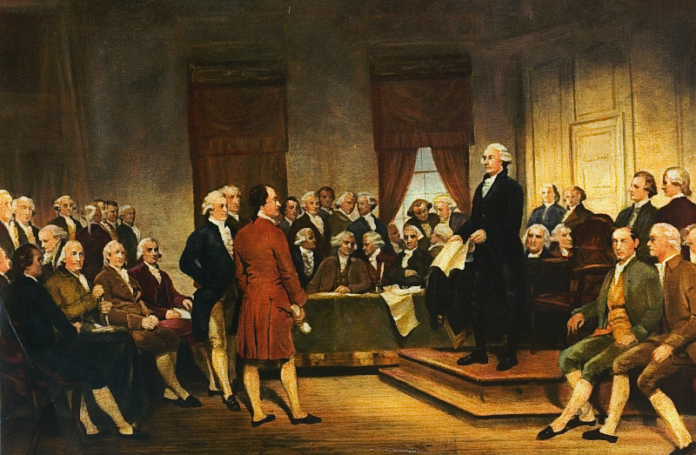A gambit to pass a resolution with a simple majority asking Congress to call for a convention of states died in the Senate on Wednesday afternoon.
The Senate voted 21-19 to send the resolution back to committee after senators protested an effort to pass the resolution with a simple majority instead of the two-thirds vote required by the state constitution.
“The Kansas Constitution is too important than to just throw it away,” said Republican state Sen. Rob Olson of Olathe.
“Today is a sad day,” Olson said. “We’re trying to move something through on a majority vote that takes a clear constitutional majority to pass out of this body.
“When we start playing games with the rules, we’re not going to be any different than them guys in Washington, D.C. It’s a mess up there. It’s a mad house.”
The resolution called for a convention of states to impose fiscal restraints on the federal government and limit the power and jurisdiction of the federal government.
The state constitution stipulates the Legislature needs a supermajority to ask Congress to call a convention of states for proposing amendments to the U.S. Constitution.
However, Senate President Ty Masterson had hoped to put that to the test using a 2019 attorney general’s opinion that suggests the constitutional provision isn’t binding, even though it’s in the state constitution.
Masterson planned to declare the resolution passed even if it received a simple majority but failed to make the two-thirds requirement established by the state constitution. The issue became moot when the Senate sent the resolution back to committee.
By declaring the resolution passed – assuming it received at least 21 votes – it would have set the stage for a legal challenge to resolve questions about how many votes does it take to pass a resolution asking for a convention.
“I would like an answer to that question,” Masterson said. “Am I disappointed it didn’t get done today? Yeah. There will be a point when that question’s answered.”
In 1974, Kansans voted to amend the state constitution to require two-thirds of the Legislature to ratify any amendment to the U.S. Constitution or to ask for a constitutional convention.
But the 2019 attorney general’s opinion said the Legislature is bound by the two-thirds vote requirement by the rules it adopted and not the state constitution.
“The supermajority vote requirement to apply for Congress to call a federal constitutional convention in…the Kansas Constitution is precatory language,” the office wrote.
“We likewise conclude the Legislature may adopt rules requiring a two-thirds vote to apply for Congress to call a federal constitutional convention,” the opinion stated.
The current House rules require a two-thirds majority to seek a convention, while the Senate rules don’t address the number of votes needed to pass the bill.
Article V of the U.S. Constitution provides for amending the document, including calling for a convention of states to propose amendments.
The attorney general’s opinion noted that Article V does not explicitly authorize or forbid a state from adopting specific requirements for ratifying a constitutional amendment.
Convention of States Action had called on the Senate to pass the bill with a simple majority, saying the 1974 constitutional amendment was “slipped in without debate” to protect against the Supreme Court’s decision in Roe v. Wade.
David Schneider, regional director of Convention of States, was outside the Senate chamber after the vote. He wouldn’t comment.
Earlier in the day, the group issued a statement urging litigation to resolve the question over whether the state constitution supersedes the U.S. Constitution.
“We understand there are those who wish the Kansas Senate would ignore their duty to limit the power and scope of an out-of-control federal government,” Convention of States Action President Mark Meckler said in a statement.
“If they believe that the unconstitutional provision of the Kansas Constitution is supreme to the U.S. Constitution, we encourage them to use the legal methods available to
make such a challenge,” he said.
The resolution was about the same as one that was considered in the state Senate in 2018.
Three years ago, the resoluton came up five votes short of the 27 needed for passage in the Senate. It didn’t get a vote in the House in 2018.
A similar resolution in 2016 passed 77-47 in the House, but it was seven votes short of the two-thirds majority required by the constitution.













